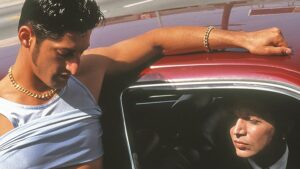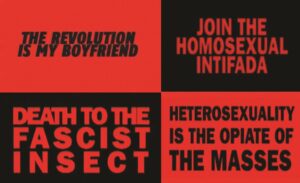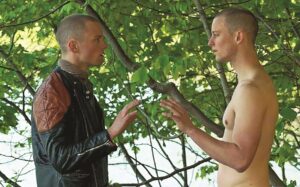“John Waters and Andy Warhol were two of my biggest influences when I was starting out,” says Canadian filmmaker Bruce LaBruce. “At Warhol’s Factory there were a lot of drugs and crazy sex going on and alternative artists. He kind of built a myth around them. John did the same thing — a kind of star system. He was very underground and pornographic in his early films.

“I first met John at a book-signing for Shock Value in the ’80s,” LaBruce continues. “I was very punked out at the time. I posed with him for a picture, which I published in my fanzine. I really took Shock Value to heart. It was very punk, like an electric shock, trying to jolt people out of their ideas of morality. Plus, it was fun.”
LaBruce is a low-budget provocateur who has frequently included radical politics, explicit sex, and self-conscious humor in his films. His first feature, No Skin Off My Ass (1991), is a gay punk riff on Robert Altman’s That Cold Day in the Park that opens with LaBruce taking a skinhead home for a lengthy, no-holds-barred bed scene. LaBruce shuttles back and forth between the art film and gay porn worlds in his work, sometimes merging the two. And thanks partly to his John Waters connection, he will be receiving the Provincetown International Film Festival’s top award this year, Filmmaker on the Edge, on Saturday at 5 p.m. at Provincetown Town Hall.
Waters has always been a key adviser to the festival, particularly when it comes to the Filmmaker on the Edge — he was the first artist to receive the award at the original event 25 years ago. Winners have traditionally come to the festival to be interviewed by Waters at a public gathering. The list of honorees is eclectic, ranging from such heavy hitters as Quentin Tarantino, David Cronenberg, Ang Lee, and Sofia Coppola to more outré talents such as Bobcat Goldthwait and Guy Maddin. It’s easy to see why LaBruce would be a favorite of Waters and fit well in the mix.
Born in Tiverton, Ontario in 1964, he has said at different times that Justin Stewart or Bryan Bruce is his birth name — take your pick. He studied film with noted Hitchcock scholar Robin Wood at York University in Toronto. “He was a gay Marxist feminist,” LaBruce says of Wood. “He was a big inspiration, especially about sexual repression and homosexual subtext. It was a radical new interpretation of ‘looking.’ ”

LaBruce was a founder of the “queercore” movement in the late ’80s, a reaction to sexism and homophobia in the punk scene. He made his first big splash as a filmmaker with Hustler White in 1996, which he co-directed with Rick Castro and co-starred with Tony Ward, the former Calvin Klein underwear model and boyfriend of Madonna. It was a queer send-up of Sunset Boulevard, with Ward as a gay hustler in West Hollywood pursued by LaBruce, playing a European writer.
In 2004, LaBruce followed up with The Raspberry Reich, a revisionist queer update of the terrorist Baader-Meinhof Gang story, which LaBruce says is a “critique of radical chic. One thing I loved about these characters is that they were so crazy — having group sex on the way to blowing up a building. But revolutions are all doomed to failure. The people who are doing extreme actions completely discredit themselves by doing something against their own principles. Or they become assimilated, becoming that which they’re fighting against.”

He made a couple of zombie movies after that (Otto, or Up With Dead People in 2008 and L.A. Zombie in 2010), both with explicit sex, then shifted to making movies that were shocking in other ways. “I had started using porn for political purposes — to provoke,” LaBruce says. “I would make a hard-core version and soft-core version with different audiences and different distributors.”
His 2013 feature Gerontophilia, about a gay love affair between a young aide in a nursing home and one of the elderly residents, was relatively chaste, as was his 2020 feature Saint-Narcisse, about Québecois twins, separated at birth, who fall in love. Both films explore taboos — extreme age gaps and “twincest,” respectively — without hard-core sex. “One reviewer said that the most shocking thing LaBruce could do is make a movie without porn,” he says. Like his mentor, John Waters, he enjoys reading disapproving reviews of his work and understands the backlash against his provocations. “I’m more of a dialectical thinker,” he adds. “I embrace contradictions. I contradict myself, at least.”

LaBruce continues to shoot porn films, but not for the mainstream market. “I don’t make a distinction between filmmakers and pornographers,” LaBruce says. “Pornographers are making a creative expression.” And though he’s mostly shed the piercings of his former punk life, he’s interested in the changes happening in the queer political sphere, including the transgender movement. “Because of my roots, it’s normal to be inclusive,” he says.
And right now, he’s looking forward to coming to the festival. “I lost my virginity in Provincetown,” LaBruce says. “This was with my first boyfriend in the ’80s. I haven’t been back since.”
Festivalgoers should note: there is more to the “Conversations With Honorees” event at town hall than John Waters chatting with Filmmaker on the Edge Bruce LaBruce. Billy Porter, the Excellence in Acting honoree, will be interviewed by film scholar B. Ruby Rich. Porter, who is a Grammy-award-winning singer, a Tony-award-winning Broadway performer, and a gender-bending Met Gala fashion plate, will be featured at the festival in the narrative film Our Son, which will screen on Friday, June 16 at 6 p.m. at town hall. Tickets for all films and events are available at provincetownfilm.org.



